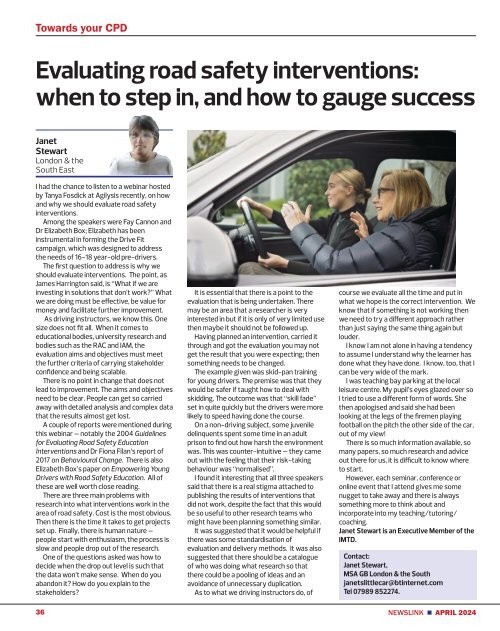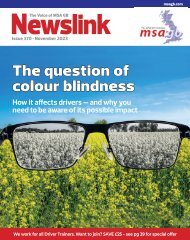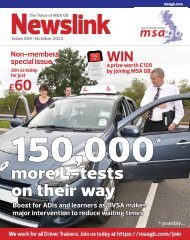Newslink April marketing special
Motor Schools Association of Great Britain - driving instructors - marketing and new members special. Road safety, driver training and testing
Motor Schools Association of Great Britain - driving instructors - marketing and new members special. Road safety, driver training and testing
You also want an ePaper? Increase the reach of your titles
YUMPU automatically turns print PDFs into web optimized ePapers that Google loves.
Towards your CPD<br />
Evaluating road safety interventions:<br />
when to step in, and how to gauge success<br />
Janet<br />
Stewart<br />
London & the<br />
South East<br />
I had the chance to listen to a webinar hosted<br />
by Tanya Fosdick at Agilysis recently, on how<br />
and why we should evaluate road safety<br />
interventions.<br />
Among the speakers were Fay Cannon and<br />
Dr Elizabeth Box; Elizabeth has been<br />
instrumental in forming the Drive Fit<br />
campaign, which was designed to address<br />
the needs of 16-18 year-old pre-drivers.<br />
The first question to address is why we<br />
should evaluate interventions. The point, as<br />
James Harrington said, is “What if we are<br />
investing in solutions that don’t work?” What<br />
we are doing must be effective, be value for<br />
money and facilitate further improvement.<br />
As driving instructors, we know this. One<br />
size does not fit all. When it comes to<br />
educational bodies, university research and<br />
bodies such as the RAC and IAM, the<br />
evaluation aims and objectives must meet<br />
the further criteria of carrying stakeholder<br />
confidence and being scalable.<br />
There is no point in change that does not<br />
lead to improvement. The aims and objectives<br />
need to be clear. People can get so carried<br />
away with detailed analysis and complex data<br />
that the results almost get lost.<br />
A couple of reports were mentioned during<br />
this webinar – notably the 2004 Guidelines<br />
for Evaluating Road Safety Education<br />
Interventions and Dr Fiona Filan’s report of<br />
2017 on Behavioural Change. There is also<br />
Elizabeth Box’s paper on Empowering Young<br />
Drivers with Road Safety Education. All of<br />
these are well worth close reading.<br />
There are three main problems with<br />
research into what interventions work in the<br />
area of road safety. Cost is the most obvious.<br />
Then there is the time it takes to get projects<br />
set up. Finally, there is human nature –<br />
people start with enthusiasm, the process is<br />
slow and people drop out of the research.<br />
One of the questions asked was how to<br />
decide when the drop out level is such that<br />
the data won’t make sense. When do you<br />
abandon it? How do you explain to the<br />
stakeholders?<br />
It is essential that there is a point to the<br />
evaluation that is being undertaken. There<br />
may be an area that a researcher is very<br />
interested in but if it is only of very limited use<br />
then maybe it should not be followed up.<br />
Having planned an intervention, carried it<br />
through and got the evaluation you may not<br />
get the result that you were expecting; then<br />
something needs to be changed.<br />
The example given was skid-pan training<br />
for young drivers. The premise was that they<br />
would be safer if taught how to deal with<br />
skidding. The outcome was that “skill fade”<br />
set in quite quickly but the drivers were more<br />
likely to speed having done the course.<br />
On a non-driving subject, some juvenile<br />
delinquents spent some time in an adult<br />
prison to find out how harsh the environment<br />
was. This was counter-intuitive – they came<br />
out with the feeling that their risk-taking<br />
behaviour was “normalised”.<br />
I found it interesting that all three speakers<br />
said that there is a real stigma attached to<br />
publishing the results of interventions that<br />
did not work, despite the fact that this would<br />
be so useful to other research teams who<br />
might have been planning something similar.<br />
It was suggested that it would be helpful if<br />
there was some standardisation of<br />
evaluation and delivery methods. It was also<br />
suggested that there should be a catalogue<br />
of who was doing what research so that<br />
there could be a pooling of ideas and an<br />
avoidance of unnecessary duplication.<br />
As to what we driving instructors do, of<br />
course we evaluate all the time and put in<br />
what we hope is the correct intervention. We<br />
know that if something is not working then<br />
we need to try a different approach rather<br />
than just saying the same thing again but<br />
louder.<br />
I know I am not alone in having a tendency<br />
to assume I understand why the learner has<br />
done what they have done. I know, too, that I<br />
can be very wide of the mark.<br />
I was teaching bay parking at the local<br />
leisure centre. My pupil’s eyes glazed over so<br />
I tried to use a different form of words. She<br />
then apologised and said she had been<br />
looking at the legs of the firemen playing<br />
football on the pitch the other side of the car,<br />
out of my view!<br />
There is so much information available, so<br />
many papers, so much research and advice<br />
out there for us, it is difficult to know where<br />
to start.<br />
However, each seminar, conference or<br />
online event that I attend gives me some<br />
nugget to take away and there is always<br />
something more to think about and<br />
incorporate into my teaching/tutoring/<br />
coaching.<br />
Janet Stewart is an Executive Member of the<br />
IMTD.<br />
Contact:<br />
Janet Stewart,<br />
MSA GB London & the South<br />
janetslittlecar@btinternet.com<br />
Tel 07989 852274.<br />
36 NEWSLINK n APRIL 2024
















